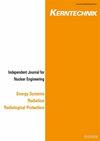Application of the COCOSYS code in the safety evaluation of Czech nuclear power plants
IF 0.4
4区 工程技术
Q4 NUCLEAR SCIENCE & TECHNOLOGY
引用次数: 0
Abstract
Abstract Safety analyses of nuclear power plant accidents are a key tool in demonstration of nuclear safety and reliability. The chain of the safety analyses comprises several follow-up activities like neutronic core calculation, primary system simulation and containment response to a loss-of-coolant accident. The analyses can be done with numerous computational tools like the GRS codes ATHLET and COCOSYS. The COCOSYS and its predecessor RALOC have been used in a variety of safety analyses at UJV conducted in the framework of technical support of the Czech nuclear power plants. Application of the code in the field of nuclear power plant safety analyses is ruled by the Czech legislative, which defines a process called standardization. The standardization procedure equivalent to validation and verification process provides further independent validation on the level of user organization. In past decades, COCOSYS has been successfully used in numerous DBA and DEC-A analyses of VVER-1000/V-320 containment, evaluating both thermal hydraulic conditions as well as fission product source term. This paper summarizes independent COCOSYS validation at UJV, including setup of the iodine dry paint deposition model to Ameron Amerlock paint. Furthermore, a VVER-1000/V-320 containment model is presented and analysis of DBA and DEC-A LB LOCA at VVER-1000/V-320 is conducted. The evaluation of the results aims at confirmation of acceptance criteria related to containment and impact of containment spray system. An emphasis is given to evaluation of containment source term, where comparison of both events is conducted for release of iodine, cesium, and xenon.COCOSYS规范在捷克核电厂安全评价中的应用
核电厂事故安全分析是核安全可靠性论证的重要工具。安全分析链包括几个后续活动,如中子堆芯计算、初级系统模拟和对冷却剂丢失事故的遏制反应。分析可以用许多计算工具来完成,比如GRS代码ATHLET和COCOSYS。COCOSYS及其前身RALOC已用于UJV在捷克核电厂技术支持框架内进行的各种安全分析。在核电厂安全分析领域,规范的应用由捷克立法机构决定,该机构定义了一个称为标准化的过程。等同于验证和验证过程的标准化过程在用户组织层面上提供了进一步的独立验证。在过去的几十年里,COCOSYS已经成功地用于VVER-1000/V-320容器的许多DBA和DEC-A分析,评估热液压条件以及裂变产物源项。本文总结了COCOSYS在UJV的独立验证,包括建立了Ameron Amerlock涂料的碘干涂料沉积模型。建立了VVER-1000/V-320的安全壳模型,并对VVER-1000/V-320下的DBA和deca LB LOCA进行了分析。评价结果的目的是确认与密封和密封喷雾系统的影响有关的验收标准。重点是对遏制源项的评价,其中对两个事件进行了碘、铯和氙释放的比较。
本文章由计算机程序翻译,如有差异,请以英文原文为准。
求助全文
约1分钟内获得全文
求助全文
来源期刊

Kerntechnik
工程技术-核科学技术
CiteScore
0.90
自引率
20.00%
发文量
72
审稿时长
6-12 weeks
期刊介绍:
Kerntechnik is an independent journal for nuclear engineering (including design, operation, safety and economics of nuclear power stations, research reactors and simulators), energy systems, radiation (ionizing radiation in industry, medicine and research) and radiological protection (biological effects of ionizing radiation, the system of protection for occupational, medical and public exposures, the assessment of doses, operational protection and safety programs, management of radioactive wastes, decommissioning and regulatory requirements).
 求助内容:
求助内容: 应助结果提醒方式:
应助结果提醒方式:


